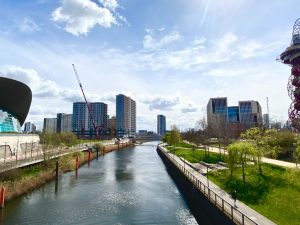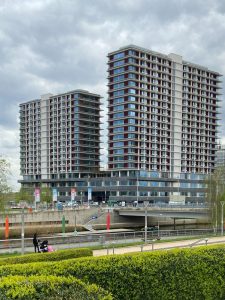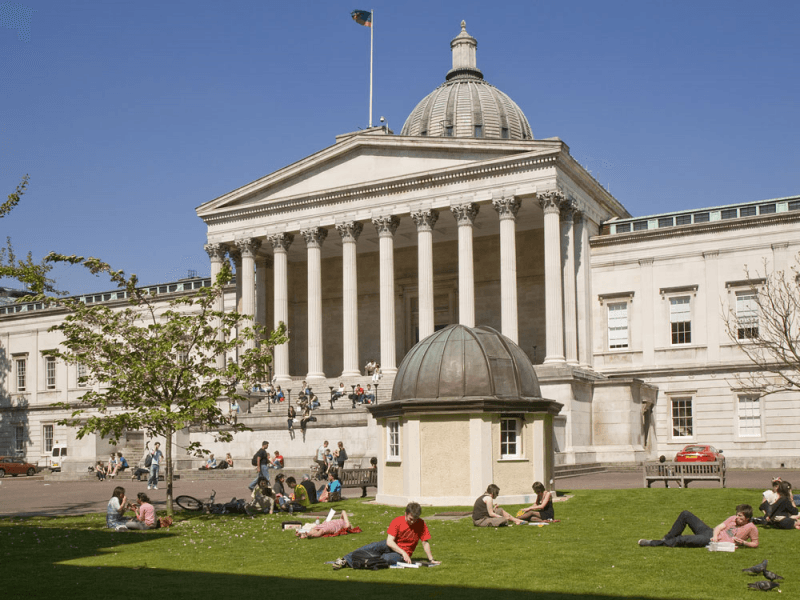In early Spring, Prof David Price facilitated a series of virtual “Meet the Team” events to help colleagues in different parts of Research, Innovation and Global Engagement (RIGE). One of these events, held on 10 March via MS Teams, focused on our work in Library, Culture, Collections and Open Science (LCCOS), to familiarise colleagues in other parts of RIGE with the role of LCCOS.
In order to provide all staff in LCCOS with an overview of our department, this blog post provides a short summary of the session. The slides are available at LCCOS Meet the Team.
Martin Moyle, Director of Services, opened the event, explaining that the LCCOS presentation would comprise a very brief overview of LCCOS and Library Services, followed by five short presentations highlighting specific areas of LCCOS likely to be of particular interest to RIGE colleagues.
He then gave a short introduction to LCCOS, which since December 2021 has brought together Library Services, UCL Culture, Research Integrity, Research Culture and Open Science. He highlighted the size of the new department – with 440 staff, by far the largest constituent part of the RIGE portfolio.
Martin went on to introduce Library Services, highlighting the fact that with 4.8 million annual visits to our libraries, UCL is the busiest university library service in the UK. He also emphasised UCL’s internationally important collections, the innovative services which Library staff provide (for instance ‘Click and Collect’ introduced during the pandemic) and the sheer scale of both physical and digital resources. We hold over 2 million print items and provide access to over 1.1 million e-books, plus 86,000 e-journals and 800+ databases! On Special Collections, Martin presented the team’s role in managing, conserving and making accessible 10,000 linear metres of rare books, archives and records. He emphasised that we hold one of the foremost collections of such material in the UK, and emphasised that they are not simply kept under lock and key, but are well used for teaching, research and outreach.
Charting the Library’s performance, Martin presented key metrics (National Student Survey, Postgraduate Taught Experience Survey, Postgraduate Research Experience Survey) which showed how UCL has outperformed other UK libraries in supporting users during Covid, although our NSS scores dropped to 79.9% from 88.5% pre-Covid. Surveys shows consistent high satisfaction with the online library and lower scores for the physical library, which we know is due to historic under-investment in physical spaces and ongoing challenges in providing enough study spaces for our ever-growing student cohorts. He also highlighted the latest UCL faculty compliance with REF OA Policy at 88-96% as a measure not only of the OA Team’s success, but as a mark of successful partnerships across RIGE.
June Hedges, Head of Liaison and Support Services, amplified Martin’s introduction with a more in-depth overview of Liaison and Support Services, which includes Open Science, Research Data Support, Bibliometrics Support and Research Integrity as well as Academic Engagement, Library Skills, Teaching and Learning Support and Open Access Services. In essence, Liaison and Support Services are all about enabling the learning and research of the UCL community, whether that is introducing new undergraduate students to UCL’s libraries and our services during the induction period, or providing support for seasoned researchers when they come to publish their outputs. Teams within Liaison and Support Services. The teams within the group vary greatly in size, from a “team” of one supporting bibliometrics, to the many in the Open Access Team, but all of them actively collaborate and work with colleagues across RIGE and the whole of UCL. June briefly introduced each team and pointed to more information about their work (via web links).
Paul Ayris, Pro-Vice-Provost (Library, Culture, Collections and Open Science) then presented on Open Science, setting the international context and outlining UCL’s strategy and the role of UCL’s Office for Open Science. Paul set out the 8 pillars of Open Science, and described how LCCOS was able to support all of these through leadership, advocacy and engagement. Detailed information on the Office for Open Science and Scholarship is available at https://www.ucl.ac.uk/library/open-science-research-support/ucl-office-open-science-and-scholarship. Paul also illustrated UCL’s position as a leader in Open Access since 2000, based on a chart showing research output and the percentage of OA publications within each institution in the Russell Group. UCL has consistently topped this chart over two decades, with Oxford, Cambridge and Imperial jostling for the remaining top 3 places. Finally, Paul presented UCL Press as an example of the impact of Open Science: with over 5m downloads from 246 countries, the research published through the UK’s first fully Open Access university press is reaching a truly global audience. The success story of UCL Press contributes to UCL’s leadership role in Open Science and LCCOS will continue to develop this agenda over the coming years.
Frank Penter, Director of Operations (UCL Culture) gave a sweeping overview of Museums, Collections, Public Programme, Theatre and UCL Engagement. The team manages 8 cultural venues, including 3 accredited museums and the Bloomsbury Theatre as well as collections which encompass over 160,000 objects ranging from Ancient Egyptian dresses to Jeremy Bentham’s head! Frank presented how UCL collections are embedded in teaching, with over 5,000 student uses of collections per year (and 3,100 specimens used in the Grant Museum in term 1 only!), and in research. For instance, the Petrie received 32 researchers from 5 different countries in Term 1 of this academic year. Pre-Covid around 1,300 research visits were handled annually. In addition to these ‘standard’ research support activities, the team also work on a number of funded projects with external and internal partners. Frank also explained that the Bloomsbury Theatre is actively used for student co-curricular activity, UCL academic and research activity as well as its range of commercial productions. Frank explained the work of the Programmes and Exhibitions team and their role in working with academics to develop activity and exhibitions in our museums and the Octagon/Cloisters. Frank presented UCL Engagement, who are here to spark connections between people and ideas. Frank illustrated what the team can help with, including advice and support, training (such as an Online Public Engagement course, or Public Engagement Skills and Practice for researchers and PhD students) and funding (such as Beacon Bursaries, Train and Engage, or Listen and Learn funds). Finally, Frank presented the ground-breaking work of the Co-production Collective.
Emma Todd, Head of Research Culture, then presented work she has been leading on a wide-ranging transformation project. Research culture describes the environment in which research and innovation happens. It is made up of the expectations, values, attitudes and behaviours of our research communities and it shapes how research is created, how it’s stored, shared and the outputs that are delivered. Emma explained that there is an increasing focus on Research Culture within the sector – from Government and funders and also across peer institutions. Culture really does eat strategy for breakfast, as the famous quote goes from management consultant and writer Peter Drucker. If the culture isn’t right, we can’t fully deliver on UCL’s ambition. It is widely accepted in the sector that current research culture is not effective in helping sustain research excellence or the wellbeing of the people who deliver the research. Emma noted that there are also financial and reputational reasons why it’s important – funder requirements (including for quality-related research (QR) funding through REF) and our ability to attract the best researchers depends on UCL doing more to enhance its research culture. Wholesale change will require research organisations, funders, publishers and government to coordinate and consistently apply practical actions across the research community. But in the meantime, this complexity should not stop UCL from making progress on an institutional basis. Emma described what we’re doing at UCL, broken down into 3 parts. The first part between April – Aug 2021 was consultation with the research community. Part 2 is ongoing short term action in the form of a 6-month £1m+ Enhancing Research Culture Programme – ERCP (Feb-Jul 2022). Finally, Part 3 will be to develop a roadmap for cultural change (Apr – Sep 2022). Emma explained that she and her small temporary team (currently funded until 31st July) will deliver this project by working across UCL, with Faculties, colleagues in RIGE and in central Professional Services, and by integrating existing activity – of which there is a lot. A Research Culture Operations Group will oversee the ERCP and roadmap development and report into RIGE Committee, which will have strategic oversight.
Finally, as Director of Operations, LCCOS, I spoke briefly about space strategy, focusing on library spaces. Whilst further work would be needed to establish a space strategy after UCL’s institutional strategy was more clearly defined, I indicated that libraries and learning spaces would aim to provide a range of interrelated learning environments, offering spaces with a clear identity, fostering sense of belonging for students (for postgraduate students, for instance), but also encouraging cross-disciplinary working. I added that space would also be develop to help extend the shared services model based on hubs, the Student Centre and UCL East approach, creating a local hub for students, e.g. within each Faculty. I also noted that, as noted in previous Strategic Operating Plans, LCCOS would explore the feasibility of concentrating print stock in fewer sites to allow world-class user experience (24-hour opening, faculty identity, access to specialist services and resources including unique print collections) and improve financial and environmental sustainability. This could be complemented by Library-managed learning spaces. This piece of work would follow from the UCL strategy and Estates masterplan, when those institutional plans are developed. I highlighted the ongoing work to establish a UCL Special Collections facility to exploit the exceptional institutional assets, particularly for cross-disciplinary research work. This could be linked to a wider Arts & Humanities and Social Sciences hub, potentially in partnership with other academic institutions in London. Finally, I outlined potential for developing libraries further as portals between UCL and local communities, which presents a great opportunity to work with colleagues in museums, collections, public engagement and Open Science.
 Close
Close






